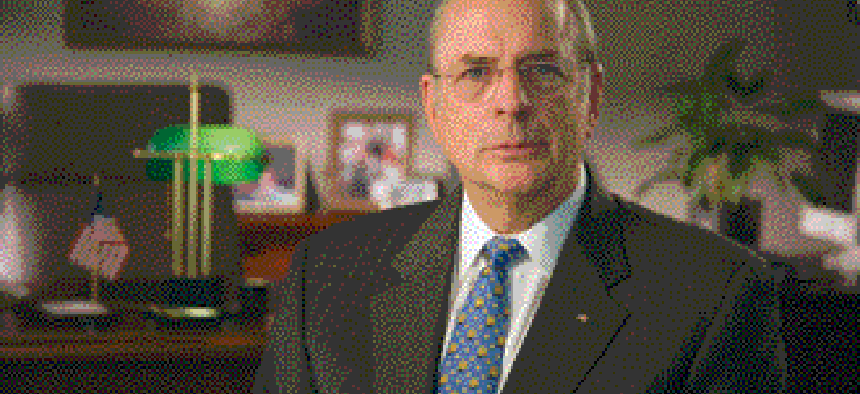Profile: Norman Augustine | Augustine reflects on a changed industry

Globalization is the new challenge for companies.
In business, change is a constant, and in no industry is that more uniquely challenging than in the defense business, says Norman Augustine, former chairman of Lockheed Martin Corp.Augustine, who has been involved in the defense industry since 1958, should know. He's credited with spearheading the industry's consolidation and move into IT.Augustine "was the primary architect for the structure of the aerospace industry today," said Denis Bovin, vice chairman of Bear, Stearns and Co. "He was among the very first to understand the customers' needs and to take bold action to configure what became Lockheed Martin" to meet them.Augustine began his aerospace career as an engineer for Douglas Aircraft Co. In 1965, he went to work for the government as assistant director of defense research and engineering in the Defense secretary's office. After a stint in the private sector, at LTV Missiles and Space Co., in 1973, he rejoined the government. There, he worked his way up from assistant secretary of the Army to under secretary to acting Secretary.Returning to the private sector in 1977, Augustine ran Martin Marietta Corp. until its 1995 merger with Lockheed Corp. As chairman of the combined Lockheed Martin Corp., he watched the company grow into what today is the world's largest defense contractor. He retired in 1997.Augustine's advice for today's industry leaders: "If you're going to make a major change, do it quickly and get it over with."One might think that change should be introduced slowly so you don't disrupt people and disrupt work," he said. "The lesson we learned was that uncertainty is more disruptive than change itself. If change is to be made, get it over with. That was probably the single most important lesson that came out of this."Some of his greatest challenges came in the years "when the defense industry was cutting back so much, it became apparent we were going to have to follow a new strategy if we were going to survive," Augustine said."Clearly the industry was going to downsize, and probably three-quarters of the companies in the business were going to be gone," he said. To avoid being one of those, his company expanded its information-services capabilities while buying and consolidating new companies. Government's decision to block the planned merger of Lockheed and Northrop Grumman Corp. was "one of the biggest disappointments in my career," he said.But, overall, that career has been far from disappointing. When his company began its transformation, "we were well aware that the statistical record of emerging companies," he said. "About 80 percent of those fail, so the odds were not on our side. On the other hand, we were interested in the long term, not the short term, so we thought we could beat those odds, and, thanks to the huge efforts of a lot of people, I think we did.""When all was done, there were 17 companies or parts of companies that combined to make Lockheed Martin," Augustine said.Keeping up with technology was, and remains, important for defense companies, Augustine said. "The first challenge is always to design quality products when you're building complex systems with lots of parts that interact," he said. "If you've had a streak of building lots of products that don't work well, it's catastrophic for a business."Today's defense companies face new challenges, chief among them globalization. "The defense industry needs to address that in a unique fashion," Augustine said. "Defense pertains to national defense. The word 'national' is in there, and that means the ground rules in terms of globalization of defense will be [more stringent than] the ground rules in the commercial marketplace."As technology continues to evolve, companies will have to work with increasingly complex systems, which will require more skilled workers, he said.Finding people who have the requisite skill sets is becoming harder in a global marketplace, he said.Commercial IT companies can hire workers from anywhere in the world, Augustine said, but "in defense, for security reasons, you have a much more limited body of people you can hire from."Today, Augustine remains as involved as ever, although the venue has changed. He serves on corporate and charitable boards and advisory panels. After retiring from Lockheed Martin, he taught engineering at Princeton University, his alma mater, for an experience he calls "one of the highlights of my life." Although he left the Princeton faculty in 1999, he stays in touch with his students and says he's "about as busy as when I was working."A published author and world traveler ? he has visited both North and South poles ? Augustine yet has worlds to conquer, he said. Photography, tennis and woodworking are "still on my to-do list."Nora Mancuso is a freelance writer in Williamston, Mich.


"If you're going to make a major change, do it quickly and get it over with," said Norman Augustine, former chairman of Lockheed Martin Corp.
Courtesy photo
NEXT STORY: Profile: George Pedersen | Expectations exceeded

